Why the Internet is worried that Microsoft’s consumer services are doomed - stevenscrinteme1985
The doubtfulness rattled around the Twitterverse this week: Now that Microsoft has unexpectedly closed Groove Music Pass, can it be trusted to nourish other consumer products and services?
IT's non an idle question. Every cancelled consumer product—the Zune music participant, Windows phones, the Microsoft Dance orchestra—resurfaces the same angry protest: Doesn't Microsoft care about consumers?
If "care" substance app development, yes: Both the Zune and Groove Music Pass evolved into reasonably good services, even if few used them. If "care" refers to merchandising, though, you already know the answer: In general, no. And if you travel along the money—which in this case, comes mostly from Microsoft's enterprise businesses—that's most likely the real reason why no Microsoft consumer service can flavor entirely safe.
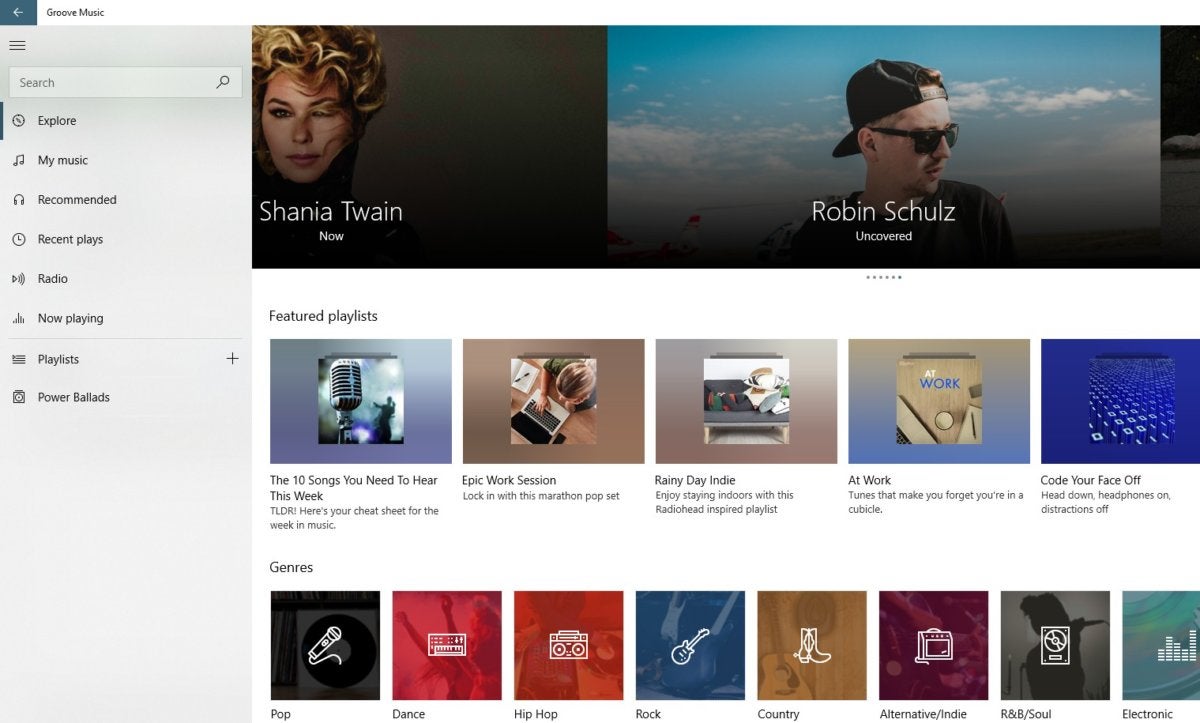 Mark Hachman / IDG
Mark Hachman / IDG Though few multitude used it, Groove Medicine Pass was a acceptable, if not great music service, with recommendations and downloadable music. Just World Health Organization knew about it?
When push comes to shove, enterprise wins taboo
While Microsoft's offse love may have been consumers, its tending quickly turned to businesses. Windows lost its express consumer focus after Windows XP, and like two other tentpole products, Skype and OneDrive, information technology evolved to serve both consumers and businesses. Windows phones—what's far left of them—evolved from consumer products into productivity devices. And Microsoft often neglected consumer marketing—even Eastern Samoa Apple took object at Windows' hegemony, over again and again.
Today, Microsoft sells more to businesses and enterprises than it does to consumers. The emphasis now is on subscriptions and abstract services, rather than on shrinkwrapped products IT can put away on store shelves. Its watchwords are Microsoft 365, Azure, artificial intelligence and bots, not PCs and phones. Then-named "consumer" devices like the Surface are really aimed toward business customers, exceptions like the Surface Laptop nothwithstanding. Still, PC executives questioned Microsoft's commitment to the Surface line during a commercial enterprise event this week in Venice, Italy.
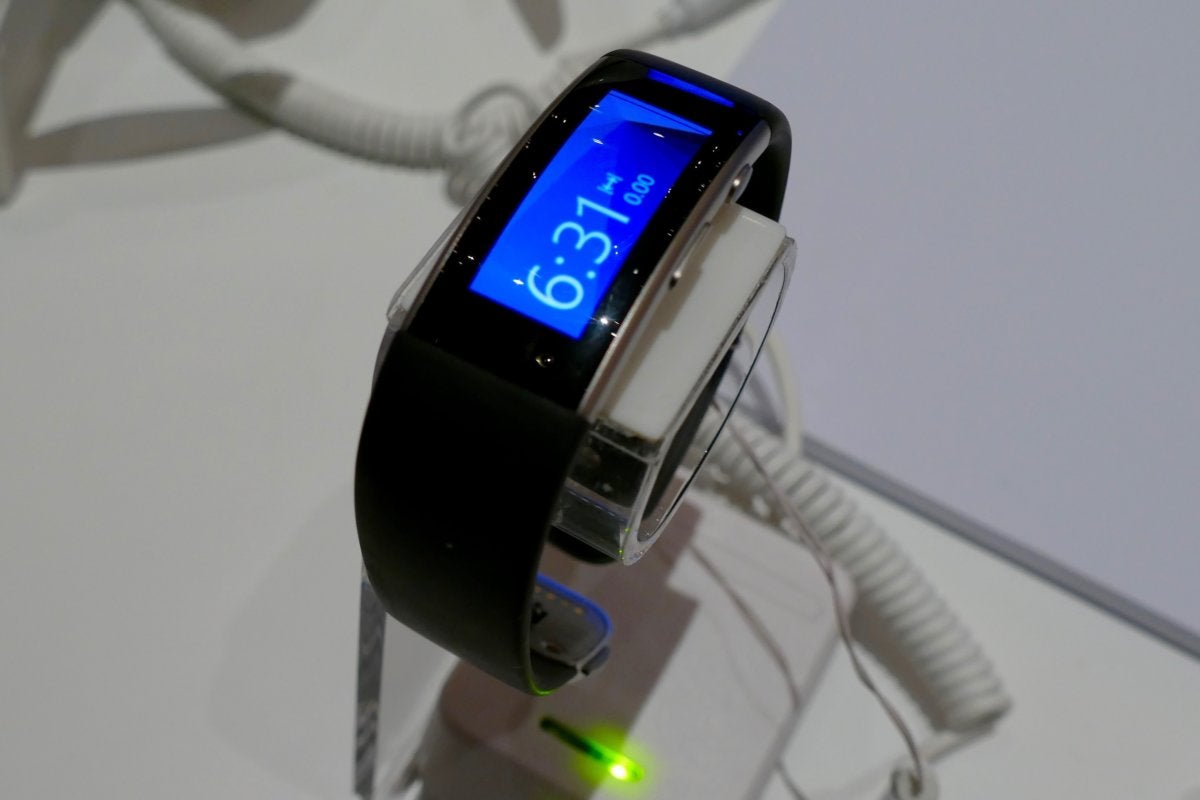 Henry James Niccolai / IDG
Henry James Niccolai / IDG Did Microsoft's Band 2, shown here on display in 2016, pass away because of Microsoft's lack of marketing, Oregon antimonopoly a general decline in fitness bands? Either mode, it hasn't been replaced.
When Microsoft does address consumers, though, the keep company once in a while seems almost bipolar, manically throwing 100 albums at consumers for free, than lapsing into a funk where a flagship app is hardly updated for months. For every affordably priced Surface Laptop, a Microsoft Band or Windows phone disappears. Microsoft Stores used to be showcases for the Surface, Windows Telephone, and Xbox. Today, filled mostly with partner devices, they're more like a smaller version of Best Bribe. Would anyone personify truly surprised if Microsoft Stores were the next to go?
If you'Re a Microsoft movies customer, think again
Entirely this has to make you inquire which approach Microsoft will involve with its other products and services. We can probably safely agree that "tentpole" products, suchlike Windows, Skype and OneDrive, serve enough business customers that Microsoft will leave of absence them intact.
Groove Music subscribers may enjoy a smooth conversion to Spotify, but information technology's unclear whether new services would have it As easy. Purchased MP3 files, even albums, seize on relatively tiny amounts of storage space, and Microsoft's program to transfer them to Spotify was well thought-out. Simply how much music have consumers bought from Microsoft? Those hundred albums? More? The vast majority of customers probably never bought Sir Thomas More than a couple of gigabytes' worth.
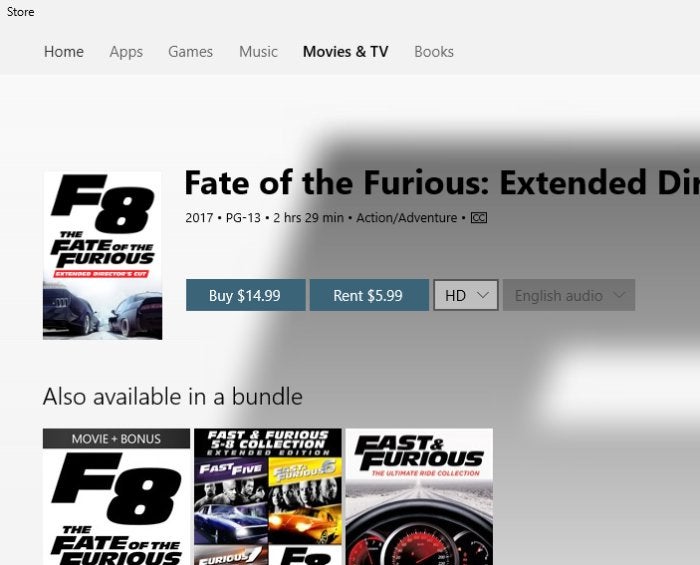 Microsoft
Microsoft Microsoft still has yet to offer 4K movie content within the Windows Store.
If you take Microsoft's Movies table service, though, the storage space and bandwidth costs begin to add astir. HD movies time in at 3GB to 4GB, and a bundle of totally sixPirates of the Caribbean movies keister runnel 25GB. That may be nothing compared to the size of it of the average online Xbox game, merely the average Movies consumer would be in a jam if the service went below.
For now, everything we've detected out of Redmond indicates that movies, TV, and ebook sales will remain intact and bequeath go on to be sold to customers. Equally of January 1, however, Microsoft's Medicine lozenge volition disappear from the Windows Store app, leaving just Apps, Games, Movies/TV, and Books. The absence will be noticeable, and consumers will curiosity: What's adjacent?
Forking the customer: Xbox operating theater mixed reality?
If you're rooting for Microsoft to increase its engagement with consumers, you can't Be happy with the scenario that will run out this dip: In a sense, Microsoft will ask its customers to decide betwixt first-coevals mixed-reality hardware such American Samoa a $499 Samsung Odyssey mind-adorned display, or a comparably priced $499 Xbox One X.
On one hand, you have the near powerful game solace in universe. On the strange, in that location's mixed world, with headsets for those WHO either couldn't afford an HTC Vive or Oculus Rift or who chose to wait. Windows integrated reality devices will pass SteamVR games, includingSuperhot, Space Highjack Flight simulator, Arizona Fair weather, and more. And they'll manifestly run Windows apps. But it is completely non compos mentis to think that the untapped market for mixed reality is large enough to sustain not one, non two, butquint different hardware partners and their unshared devices.
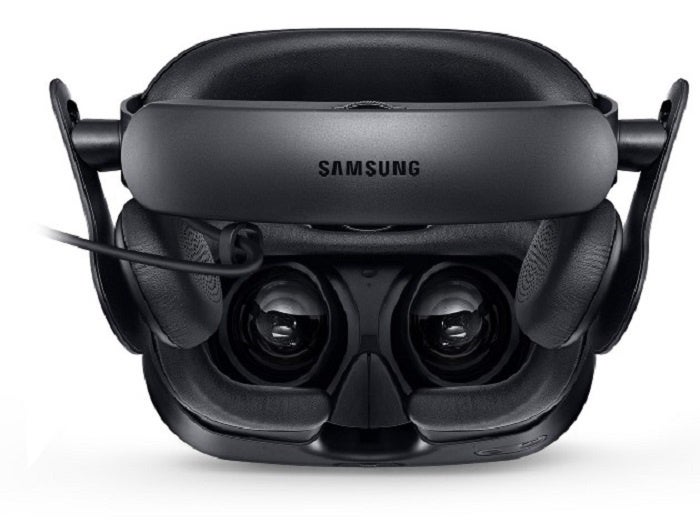 Microsoft
Microsoft Samsung's Odyssey Windows mixed reality device goes skyward against the Xbox I X this fall behind, for the Lapplander $499 toll tag.
IT's also early to bed whether any one HMD maker will make enough turned the first propagation of devices to invest in a second—or blink and bow out. But everyone potentially stands to lose. If partner investment is wasted, support fizzles; then consumers smel cheated. Interim, someone at Microsoft could conclude that consumer products aren't worth the effort, hold open for the Xbox.
Microsoft's relationship with consumers arguably reached its zenith some 2015, when Microsoft co-developed Windows 10 with its fans American Samoa part of a multi-device strategy that enclosed Surface tablets, third-party PCs, the HoloLens, a hopeful time to come for Windows phones, and more. Since then, Microsoft's reputation has come pull out to globe: Windows phones essentially died, the HoloLens disappeared, promised Windows features were delayed or off, and services like Rut are ending.
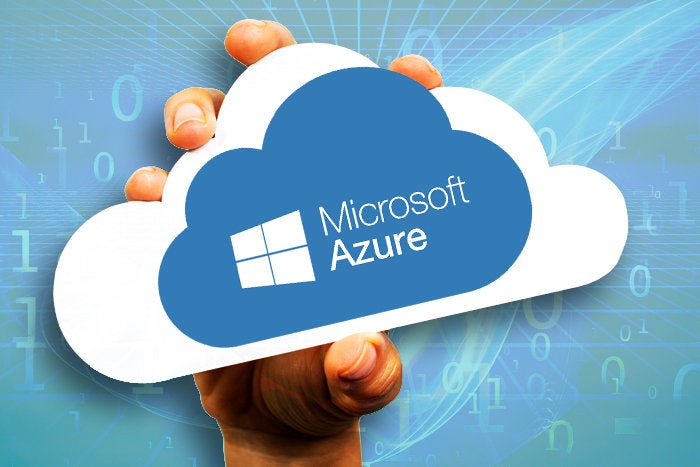 Thinkstock/Microsoft
Thinkstock/Microsoft Honorable now, this is the future of Microsoft, not you.
I don't think that Microsoft's loyal fans require to give up on Microsoft, any more than its consumer businesses enjoy shuttering the products and services they provide. Underappreciated perks like Microsoft Rewards, Xbox Live Gold, Xbox Games with Gold,Forza Motorsport 6: Apex and the free, periodic upgrades to Windows all shine Microsoft's existing committal to the consumer.
But Microsoft's inexorable move toward the enterprise leaves its consumer businesses vulnerable, with the exception of the Xbox. And Eastern Samoa its customers awaken to that realness, it's touchy to reckon how the situation will improve.
Source: https://www.pcworld.com/article/407458/microsoft-why-its-consumer-services-could-be-doomed.html
Posted by: stevenscrinteme1985.blogspot.com


0 Response to "Why the Internet is worried that Microsoft’s consumer services are doomed - stevenscrinteme1985"
Post a Comment